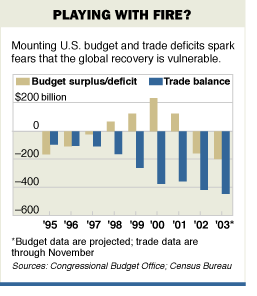
Wall Street Spin Doctors at Work
January 20, 2006
For Discussion Only
Peter Schiff is C.E.O. and Chief Global Strategist at Euro Pacific Capital, Inc.
http://www.prudentbear.com/internationalperspective.asp
When it comes to spin, Washington is no match for Wall Street.
Last Thursday, Wall Street celebrated the narrowing of America's gargantuan $68.1 billion October trade deficit to a somewhat less horrific $64.2 billion in November. The dip was a whopping $2 billion more than consensus expectations. Ignored was the fact that November’s deficit was still the third largest monthly deficit ever, and regardless of expectations, an unmitigated economic disaster. Such a "celebration" is akin to a student celebrating an “F” on his report card, as it represents an improvement on the “F-“ earned the prior semester.
There was also no shortage of pundits applying the now routine spin that America’s large trade deficit results from its superior economic growth. Since deficits are now regarded as a sign of economic strength, surpluses must evidence the opposite. This is akin to our student instead attempting to convince his parents that the “F” on his report card actually stands for fabulous.
The obfuscation continued last Friday with the release of a sharp 0.9% increase in December producer prices. Conned by Wall Street spin doctors, the media again focused on the meaningless 0.1% rise in the so called “core” rate, and expressed relief that higher energy prices did not “bleed into the core.” Who cares if one highly manipulated subset of the PPI did not rise if overall prices rose sharply? All the while Wall Street ignored the best indicator of resurgent inflation; gold prices surging to a new twenty-five year high.
Wednesday, the spin doctors demonstrated their dexterity by spinning two balls simultaneously. First they celebrated the benign 0.1% decline in December consumer prices, while ignoring the fact that the decline resulted from falling energy prices that have recently reversed course, surging by 15% in the past two weeks. Also unnoticed was the obvious double standard in that last Thursday’s big increase in the headline PPI was downplayed as being meaningless, while yesterday’s benign increase in headline CPI was cheered as great news. That’s Wall Street’s equivalent of “heads I win, tails you lose.”
Later that morning news that foreigners purchased a record $54.6 billion in Treasury debt in November was heralded as still more good news. The spin was that this unprecedented increase in foreign lending indicates growing foreign confidence in America. This is analogous to a credit card junkie celebrating a record month of charging as as proof of continued bank confidence in his creditworthiness.
The only “good’ news is that the absence of strong foreign demand for Treasuries would be an even bigger short-term disaster. With little in the way of domestic savings to pick up the slack, waning foreign demand would cause treasury prices to collapse, sending interest rates soaring, asset prices tumbling, and the U.S. economy into a severe recession. Yesterday’s news that foreigners continued to spike America’s punch bowl merely assures that our ultimate financial hangover will be that much more debilitating.
The bottom line is that accumulating record amounts of foreign debt to finance consumption is an economic fiasco that can only lead to a substantial reduction in America’s future standard of living. Celebrating our increasing debt will ultimately prove to be nothing more than a bit of comic relief in the final chapter of this developing American economic tragedy.
"To announce that there must be no criticism of the president, or that we are to stand by the president right or wrong, is not only unpatriotic and servile, but is morally treasonable to the American public." -- Theodore Roosevelt
Originally Posted by Wall Street Journal, 1/22/04, p. A10
